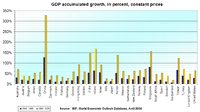
Photo from wikipedia
Recognizing the factors responsible for the gradual increase in greenhouse gas [e.g. carbon dioxide (CO2)] emissions is crucial to reduce the detrimental consequences on environmental sustainability and human life. Accordingly,… Click to show full abstract
Recognizing the factors responsible for the gradual increase in greenhouse gas [e.g. carbon dioxide (CO2)] emissions is crucial to reduce the detrimental consequences on environmental sustainability and human life. Accordingly, spotting the sectors which contribute the most to CO2 emissions and dampen economic growth have become one of the major concerns for policymakers around the globe. Against this background, this paper examines the nexus between economic growth and CO2 emissions in three Baltic countries namely Estonia, Latvia and Lithuania. Thus, the study basically checks the validity of the environmental Kuznets curve (EKC) hypothesis by taking into account the role of energy consumption and financial development over the period of 1990–2018. This type of study is highly important for the region in order to comply with the commitments of the Paris Agreement and Sustainable Development Goals of the United Nations. The study first employs appropriate testing procedures and second-generation panel data methods to account for cross-sectional dependency and slope heterogeneity among countries. Applying unit roots and cointegration tests, the study then employed different mean group estimation models and heterogeneous panel causality methods suitable for cross-sectionally dependent and heterogeneous panels. The results of the econometric analyses reveal that the inverted U-shaped EKC hypothesis does not hold in the Baltic countries. But the pollution haven hypothesis is evidenced to hold for these nations. By boosting the CO2 emissions figures, again, the study also revealed that higher levels of energy consumption exhibit adverse environmental consequences. Financial development is found to be effective in explaining the variations in the CO2 emission figures of the selected countries as well. Causality test results confirm bi-directional causality between economic growth and CO2 emissions, energy use and CO2 emissions, CO2 emissions and financial development, energy use and economic growth as well as between energy use and financial development. Furthermore, country-specific impacts are found to be similar to the corresponding panel estimates. Consistent with the findings, the study finally puts forward some policy-level suggestions. Accordingly, it is recommended that the Baltic countries need to move away from fossil-fuel dependent energy consumption growth policies to mitigate environmental degradation.
Journal Title: Environmental Science and Pollution Research
Year Published: 2022
Link to full text (if available)
Share on Social Media: Sign Up to like & get
recommendations!